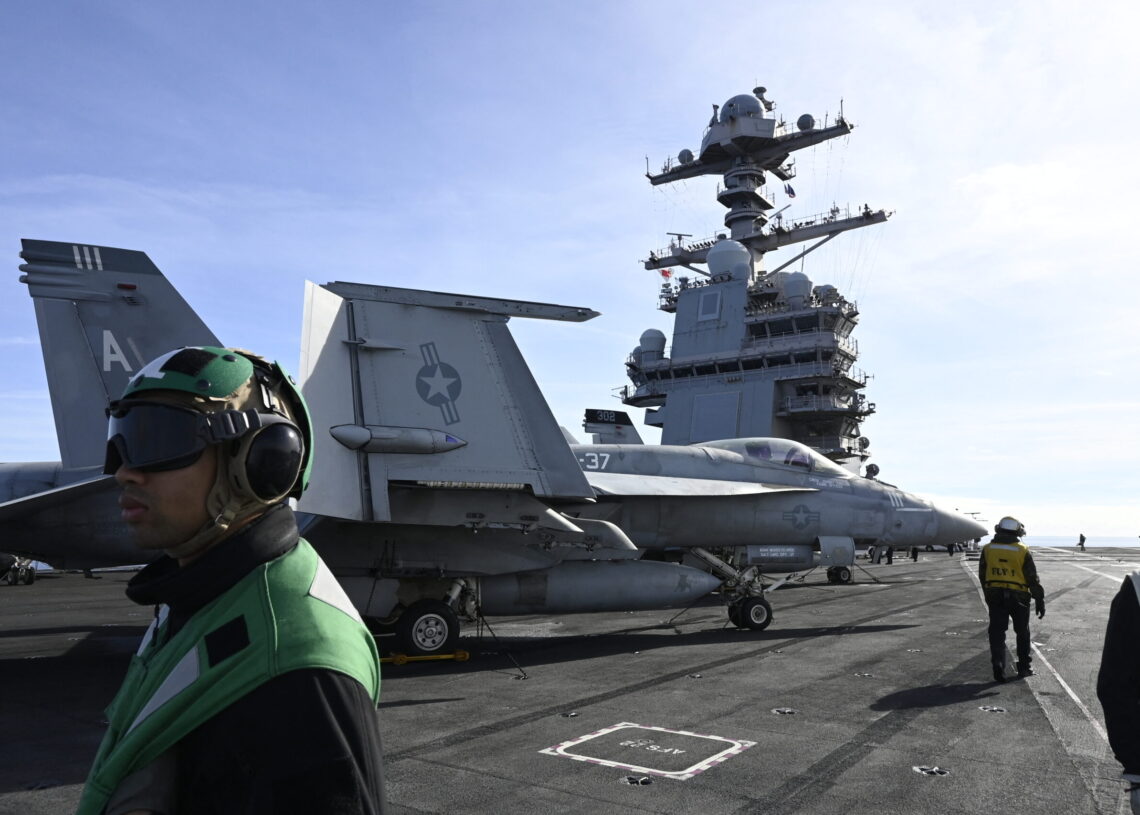The USS Gerald R. Ford aircraft carrier has entered waters near Latin America, joining a massive naval buildup that has fueled speculation the Trump administration intends to dramatically escalate its deadly counternarcotics campaign there, possibly through direct attacks on Venezuela.
The Ford and its three accompanying warships arrived in the region Tuesday, the Navy said in a news release. The ships were not yet in the Caribbean Sea but had crossed into the U.S. Southern Command’s jurisdiction, a vast area that also includes part of the Atlantic Ocean and drug smuggling routes in the Pacific used by cartels based in Colombia and neighboring Ecuador.
The USS Gerald R. Ford aircraft carrier has entered waters near Latin America, joining a massive naval buildup that has fueled speculation the Trump administration intends to dramatically escalate its deadly counternarcotics campaign there, possibly through direct attacks on Venezuela.
The Ford and its three accompanying warships arrived in the region Tuesday, the Navy said in a news release. The ships were not yet in the Caribbean Sea but had crossed into the U.S. Southern Command’s jurisdiction, a vast area that also includes part of the Atlantic Ocean and drug smuggling routes in the Pacific used by cartels based in Colombia and neighboring Ecuador.
“These forces will enhance and augment existing capabilities to disrupt narcotics trafficking and degrade and dismantle transnational criminal organizations,” Pentagon spokesman Sean Parnell said in a statement.
The development, though forecast weeks ago, appeared certain to deepen the sense of unease felt in some corners of Congress since President Donald Trump began to ruminate about a potential regime change in Venezuela. Last week, administration officials hoping to quash bipartisan legislation aimed at restraining the president’s ability to unleash military force there told lawmakers no active preparations were underway for such an attack — a declaration that persuaded enough Republicans to vote down the measure.
The breadth of firepower inherent to an aircraft carrier strike group — the Ford typically travels with dozens of fighter jets and an assortment of other lethal capabilities — would seem excessive for the type of strikes that U.S. forces have carried out on alleged drug boats since early September, experts said.
Carriers are strategic assets, and the United States uses its fleet of 11 — many of which are in scheduled maintenance and not available to sail at any given time — for power projection and deterrence in its top-tier security concerns, notably countering China in the Indo-Pacific region and maintaining a deterrent presence in the Middle East, said Mark Cancian, a senior defense adviser at the Center for Strategic and International Studies.
“The only reason to move it there is to use it against Venezuela,” Cancian surmised, adding that the Ford’s arrival means “the shot clock has started because this is not an asset they can just keep there indefinitely. They have to use it or move it. And moving it would mean they are standing down” from a potential attack on Venezuela, he said.
The Pentagon announced Oct. 24 that Defense Secretary Pete Hegseth had ordered the Ford to relocate to Latin America from Europe. It has been deployed from its home port in Virginia since June.
The Ford, which is the Navy’s most modern and largest carrier, has 4,000 sailors on board. It is accompanied by the destroyers USS Bainbridge, USS Mahan and USS Winston S. Churchill. Cancian, the analyst, said it can cost as much as $8.4 million a day to operate an aircraft carrier.
The carrier strike group’s arrival pushes the number of U.S. troops in the region to about 15,000, including personnel spread across roughly a dozen warships and reinforcements sent in recent weeks to U.S. facilities in Puerto Rico — a stunning military presence in a region that historically has seen only one or two Navy vessels assisting the U.S. Coast Guard on routine drug-interdiction missions that usually ended with the suspects’ detention and prosecution.
In a dramatic departure from precedent, Trump has upended that approach. His administration has directed the killing of at least 75 people in a campaign he and others say is necessary to halt the flow of illicit drugs destined for the United States.
Experts on the law of war contend that the Trump administration’s approach is illegal because the small vessels being targeted are carrying civilians allegedly involved in the commercial sale of drugs, not armed hostilities against the U.S. or its citizens.
To date, the 19 military strikes disclosed by the Trump administration have destroyed small speedboats in the Caribbean Sea and eastern Pacific Ocean. The president has talked publicly, however, about expanding the campaign to include targets on land.
Trump has been particularly fixated on Venezuela and its leader, Nicolás Maduro, accusing him of sending violent criminals and drugs to the U.S. — and fueling speculation that he intends to forcibly remove Maduro from power.
Trump has said publicly that Maduro’s days as president are “numbered.”
Democrats, appalled by the ongoing killings, have pushed unsuccessfully for Congress to assert its war-declaration authorities. Separate legislative efforts in the Senate — one aimed at halting the boat strikes and another at blocking Trump from starting a war in Venezuela — were rejected by a majority of Republicans.
As senators prepared for last week’s vote on the Venezuela-focused measure, administration officials made a concerted push to reassure potential GOP defectors — walking back Trump’s repeated threats of escalation and sharing with them more details about its aggressive activities to disrupt the Latin American drug trade.
Crucially, it appears, Hegseth and Secretary of State Marco Rubio provided a classified briefing for select members of Congress where they indicated the administration is not currently preparing to target Venezuela directly and didn’t have a proper legal argument for doing so, people familiar with the meeting told The Washington Post. They spoke on the condition of anonymity to discuss the meeting.
Trump himself recently said “I doubt it; I don’t think so” when asked in a “60 Minutes” interview ahead of that vote whether he intends to start a war in Venezuela.
Sen. Todd Young (R-Indiana) issued a statement last week in which he defended his decision to vote against the measure, calling it unnecessary “at this time.” Yet he also warned against a “creeping expansion of executive war-making” undermining Congress’s authority.
“I am troubled by many aspects and assumptions of this operation,” he said in his statement, “and believe it is at odds with the majority of Americans who want the U.S. military less entangled in international conflicts.”
Noah Robertson, Alex Horton and Dan Lamothe contributed to this report.
The post U.S. aircraft carrier nears Latin America as Venezuela tensions simmer
appeared first on Washington Post.




